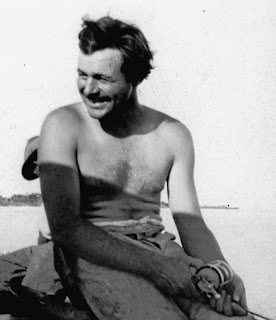A rebel and an iconoclast, Hemingway wrote with a spare, journalistic, adjective-light, description-light pen that is still, today, promoted as what "good writing" is all about.
"I'll drink absinthe."
"Do you think I should?"
"Why don't you try it? Didn't you ever?"
"No, I was saving it to drink with you."
"Don't make things up."
"It's not made up."

He wrote about a macho, men's world of hunting, bullfighting, deep-sea fishing, and war, men without women, or with women as intrusions and threats.
Eight novels, of which the most commonly read is The Sun Also Rises (1926): The angst-ridden Jake Barnes has been castrated in the War, and cannot...um...rise to the occasion. The Post-World War I Lost Generation resonates with all teenagers everywhere. They are always a Lost Generation.
It was filmed in 1956 and 1984, with Tyrone Power and Hart Bochner (top photo) playing Jake Barnes, and was transformed into an opera 2000..
Lots of short stories. The most commonly read is "A Clean, Well-Lighted Place" (1933) about a depressed man drinking in a bar.
Ten nonfiction books. The most commonly read is A Moveable Feast (1964), about Hemingway in Paris in the 1920s, hanging out with such gay luminaries as Gertrude Stein, Sherwood Anderson, Cole Porter, and James Baldwin.
Not to mention F. Scott Fitzgerald, who he took to the Louvre so they could compare the penises on ancient Greek statutes to their own.
Um...well, looking at those, any guy would think himself huge..
With all that masculine energy going on, one might easily conclude that Hemingway was gay.
Except that his stories are full of homophobic asides, men swearing and sneering at sissies, trying to prove that they're adequately masculine -- that is, not gay -- by bedding women, picking fights, and trying to land enormous fish.
In his nonfiction and personal letters he was no less contemptuous: gays were "abnormal" and "pathetic."
Maybe he was working through his own issues with same-sex desire in the homophobic era before Stonewall. After all, throughout his life, he preferred the company of men without women.




No comments:
Post a Comment
No offensive, insulting, racist, or homophobic comments are permitted.
Note: Only a member of this blog may post a comment.